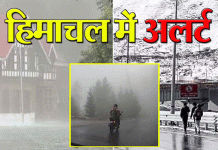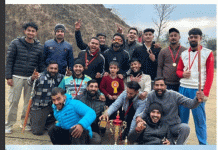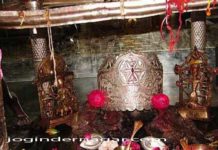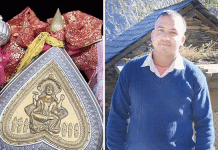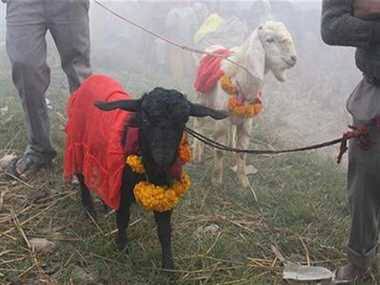 पशुबलि के मामले में सुप्रीमकोर्ट ने एक महत्वपूर्ण फ़ैसला देते हुए पशुबलि के पक्ष में एक अंतरिम राहत दी है।
पशुबलि के मामले में सुप्रीमकोर्ट ने एक महत्वपूर्ण फ़ैसला देते हुए पशुबलि के पक्ष में एक अंतरिम राहत दी है।
पशुबलि पर पूर्ण पाबंदी के हिमाचल हाईकोर्ट द्वारा 2014 में दिए गये फ़ैसले के ख़िलाफ़ सुप्रीम कोर्ट में की गयी अपील की सुनवाई पर दिए गये इस अंतरिम आदेश के अनुसार, “पशुबलि यदि अपील में सूचिबद्ध किए गए धार्मिक कार्यक्रमों और आयोजनों पर दी जाती है तो स्थानीय प्रशासन इस बात को यक़ीनी बनाए कि यह सब तय मानक़ो के अनुसार तय जगहों में ही हो।
10 अप्रैल, 2017 को दिए गये इस फ़ैसले के अनुसार, “बलि के स्थान के बारे में फ़ैसला करते समय भारत की पशु कल्याण संस्था और अन्य संबंधित पक्षों की राय ली जानी चाहिए”।
2014 में पशुबलि के ख़िलाफ़ दिए गये हाई कोर्ट के फ़ैसले के ख़िलाफ़ कुल्लू के “कारदार सेवा संघ” और कुल्लू घाटी के ईष्टदेव रघुनाथ जी के कारदार और बीजेपी के वरिष्ठ नेता महेश्वर सिंह ने अपील की थी।
“यह एक बड़ी राहत है। हिमाचल के लोगों में यहाँ के देवी-देवताओं और उनसे जुड़ी बलि आदि परंपराओं में अटूट श्रद्धा और विश्वास है। यह हमारी परंपरा और संस्कृति का अटूट हिस्सा है।”
महेश्वर सिंह ने लोगों से आग्रह किया कि वे इस राहत का दुरुपयोग न करें ताकि सदियों पुरानी परंपरा को बचाया जा सके।
इस फ़ैसले के साथ ही कुल्लू दशहरे के समापन पर दी जाने वाली पशु-बलि का रास्ता साफ़ हो गया है। ग़ौर तलब है कि, अन्तराष्ट्रीय दशहरा महोत्सव के समापन पर देवी-देवताओं के प्रति अपनी श्रद्धा और सम्मान दर्शाने के लिए एक भैंसे, भेड़े, मछली, केंकड़े और मुर्ग़े की बलि दी जाती है। 1 सितंबर 2014 को हाईकोर्ट की पाबंदी के बाद इनके स्थान पर नारियल की बलि दी जा रही थी।
As per an interim relief by the Supreme Court the age-old tradition of ‘animal sacrifice’ may soon be back in practice after three years gap with some condition imposed.
In the interim order on petitions against ban on ‘animal sacrifice’ at religious places and congregations imposed by Himachal Pradesh High Court in 2014, the Apex court said, “If any slaughter of animals is done for purposes involved in the petitions, it shall be done in an area set up in accordance with law. The Municipal Authority shall ensure such compliance.”
The court order dated 10 April, 2017 said that the Animal Welfare Board of India and another respondent in the matter may be heard while setting up such area.
The HC judgement was challenged by Kullu Kardar Sangh and Maheshwar Singh, chief care-taker of Lord Raghunath (the main deity in Kullu). A ‘Kardar’ is the care-taker of deity.
“It is a big relief. The people in the hill state have deep faith on deities and the practice of animal sacrifice for them. It’s an integral part of our tradition and culture,” said petitioner, Maheshwar Singh, who is descendant of erstwhile rulers of Kullu and is senior BJP leader.
Singh said he had already appealed to the people to make good use of the interim relief and that they should shun merciless killing of animals for sustainability of the centuries old tradition.
He said the ‘animal sacrifice’ would now be carried out in Kullu Dusshehra festival this year in the Lanka Bekar area in Kullu in accordance with law. The Municipal Committee would be approached to construct an enclosure there.
With the HC ban on ‘animal sacrifice’ in Himachal Pradesh in 2014, the age-old practice of sacrificing animals on the conclusion of Kullu Dussehra, a centuries-old festival, had to be discontinued.
For symbolic sacrifices, coconuts had substituted animals (a buffalo, a male sheep, a fish, a crab and a chicken) as offering to appease gods and goddesses at the culmination of the week-long- festivities. It was all done in tight security as it turned out to be an issue of departure from the psycho-cultural belief in hill society.
The High Court in its judgement dated September 1, 2014 had banned animal sacrifice at religious places.
HC bench comprising Justice Rajeev Sharma and Sureshwar Thakur had observed, “A startling revelation has been made as thousands of animals are sacrificed every year in the name of worship. Sacrifice causes immense pain and suffering to innocent animals. They cannot be permitted to be sacrificed to appease a god or deity in a barbaric manner.”








